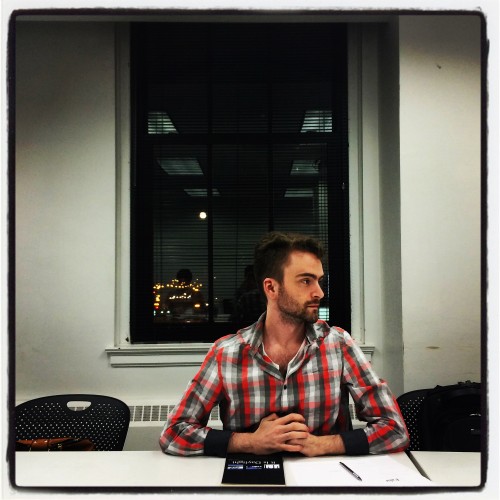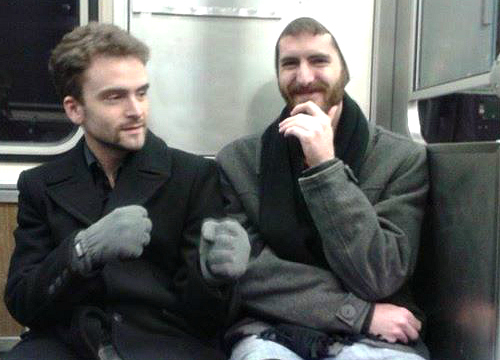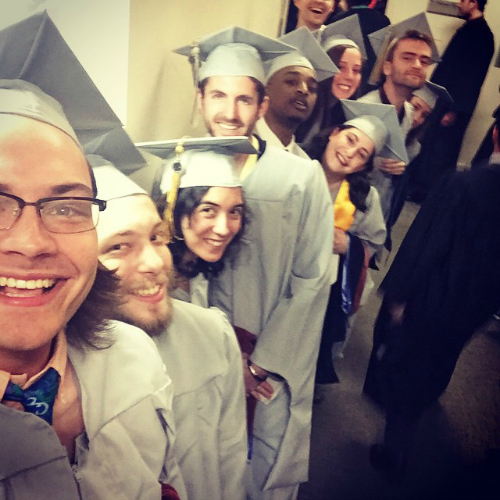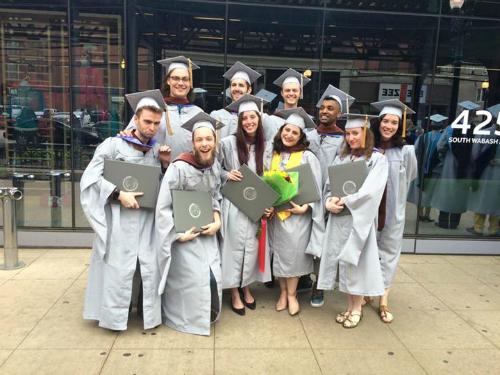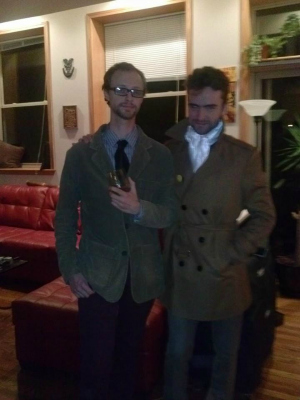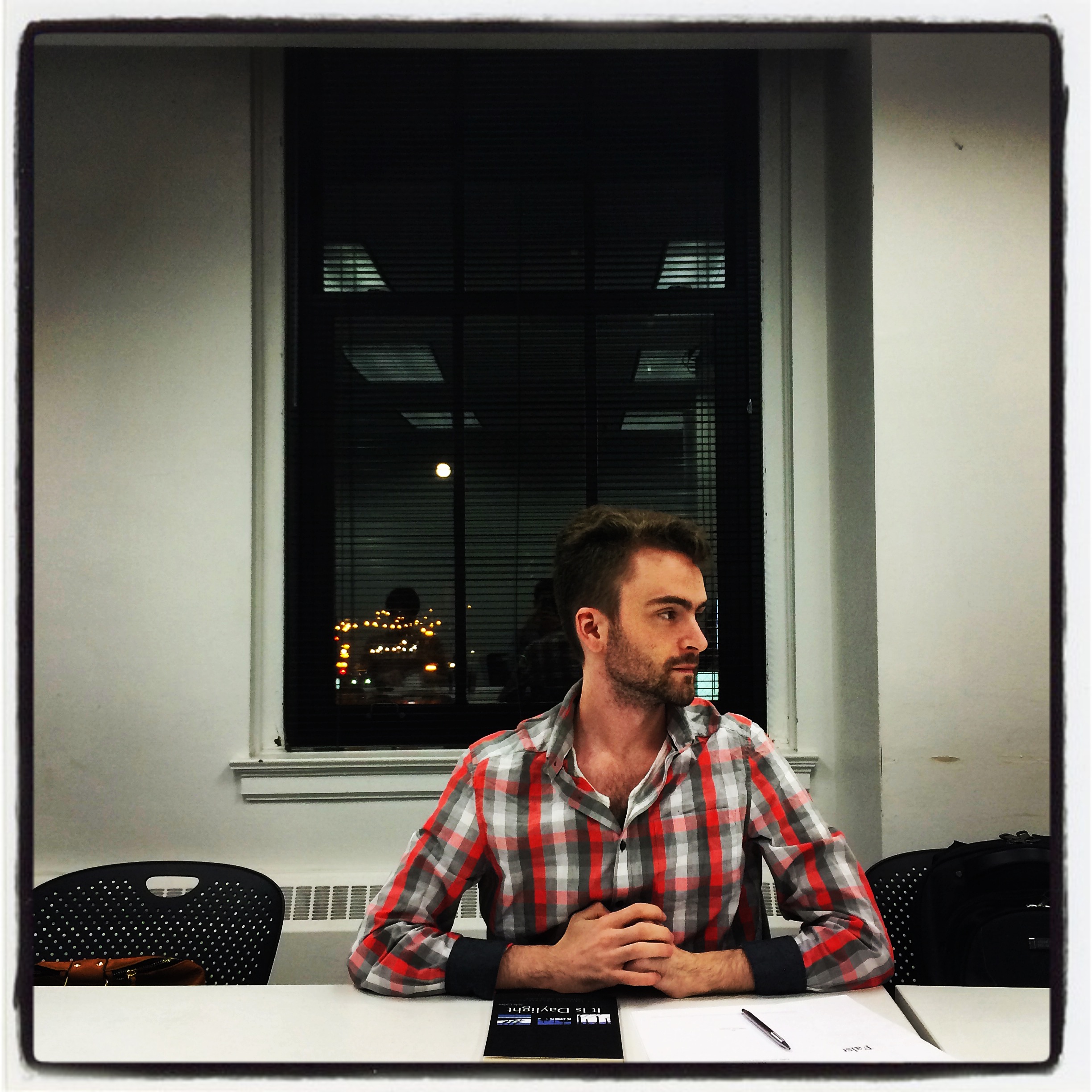
Student Spotlight: Ethan Chambers
For this week we enter the mind of my good friend and classmate, Ethan Chambers. He is a truly inspiring individual, and he was kind enough to provide some insight on what it was like choosing the program and eventually entering Columbia College Chicago. I also pick his brain and we find out what it is like to work in the advertising industry, and what it is like working and going to grad school at the same time!
How did you first find poetry?
I first learned about Poetry either when I was 3 or 4 and my father read to me from the complete works of Edgar Allan Poe. He would read me parts of the entire book in each sitting, including the short stories, and he’d normally get into character and even talk about what the stories or poems were doing. I remember being very attentive, which was odd for me at that age. I also remember his favorite poem was “The Conqueror Worm”, which still is his favorite to this day. Something about how the worm works as a metaphor and Poe’s language always piqued his interest and let him appreciate the poem. Personally, what I remember the most about the poetry collection—and it’ll sound a little ridiculous coming from a now outgoing graduate poetry student—is the image of the Raven that was on the front of the book. There was something in its white, hollow eyes and blank stare that filled my young mind with a foreboding and curiosity for each time my father read to me. I remember being frightened of the image as a child, having nightmares about it, and yet I couldn’t help myself but be drawn to the book’s cover. Of course eventually I moved beyond that, but that cover holds a very nostalgic spot for me.
Long after being acquainted with Poe, many years later, I learned there’s a certain dangerous idolization of the doomed, tragic artist. To avoid this, it’s important to read a lot when you’re young and to not stop as you get older. Reading poets and writers like Gwendolyn Brooks, Joan Didion, Li-Young Lee, Sharon Olds, D.A. Powell, Kurt Vonnegut, Anne Sexton, Emily Dickinson, J.D. Salinger, Jane Yolen, Ursula K. Le Guin, William Butler Yeats, Allen Ginsberg, Frederick Seidel, Carl Philips, Ezra Pound, Yukio Mishima, Roland Barthes, and many, many others helped push me far past Poe and any romantic idealization I may have had of what it might mean to write poetry or anything else, and really I guess to be a writer or artist. Yet, reading more also helped me appreciate that time with my father more and more.
So I guess I first found poetry as an exchange, a communion between individuals, and ever since I’ve been trying to recapture that performative gesture my father shared with me years ago. If I’m lucky enough I’d like to share that same experience with others!
Why did you ultimately choose Columbia for your graduate study?
I could go on a long drawl about the programs I considered, applied to, talk about which ones accepted me and why only the Research Oriented school rejected me, all the metrics and numbers to look at, and by the end I don’t think I’d say anything people haven’t heard before (I will say this though, having parents who work in academia and are professors can help answer a lot of questions for you in advance and help prioritize your time in the application and decision process).
So to be honest and brief: I read around 10 poems by each faculty member at Columbia. I probably read a bit more than that. The whole application process was a nervous time and my memory is a bit fuzzy. I also looked at any other types of publications I could find or any interviews or articles possibly about upcoming books or readings. Basically, anything that could give me a feeling for the program’s faculty. I decided against buying books or reading more than that because it was very clear in mind that I had to choose a school and I didn’t want to get too in love with any group of faculty or start being influenced by someone.
What I saw in Columbia was a community of different aesthetics, poets, and approaches to writing that fascinated me. Not all schools seemed to be as open to allowing such diversity in writing styles, or, to allow such freedom for exploration on the part of the students. Then there’s also the matter of the poetry scene of Chicago and the numerous reading series Columbia holds. The school seemed to keep you busy as well as expose you to new poets constantly (having been through now, yes this is true; Chicago gets a lot of visiting poets and Columbia brings in a lot of exciting and upcoming names).
This all said, there were other factors that influenced my decision to attend Columbia, such as visiting the school before my decision.
What has your experience been like in the program, and why would you suggest students also come to Columbia College Chicago?
A lot of what I’ve mentioned above. Columbia doesn’t try to push you towards any school of thought or camp of writing. You get freedom. That said, you will experience a lot of diversity from both the faculty and the other students in the program. You’ll be encouraged to try new things and experiment, with the emphasis of adding a little something new to your poetry. Really though, the other students are maybe the most important thing I experienced at Columbia. My cohort, or crew or comrades or our camaraderie, is something I wasn’t sure I’d ever experience with other artists. We learned about each other, we saw each other develop, we encouraged new directions, we let each other know when poems weren’t working or didn’t quite accomplish what was intended, and when we had reason to celebrate or someone had a reading we were there for each other.
I think the vast difference and diversity in terms of poetry styles and poetics across the group is a testament to how well the Columbia faculty did when putting my year together. I can’t thank them enough for creating that experience for us. If you’re looking for a space and atmosphere that will challenge you creatively or will expose you to a wide range of poetry, Columbia should be a school you consider.
I know you also worked for Yellow Box Advertising, while going to school full time. What has that experience been like working while going to school? And what is it like working as a creative writer in the advertising industry?
Uhh, weird.
Working for Yellow Box was one of the many things I took into consideration while choosing schools. Not often does a job just happen to align with grad school, much less one that fits your situation extremely well. I was able to work a good deal out of my apartment, as well as meeting with clients from time to time, going to and manning events, in addition to many other things. That said, I certainly don’t regret working an ad job while doing an MFA.
There’s a strange feeling or maybe sentiment I’ve seen in the last five years that working while going to an MFA is a taboo, bad thing. I strongly disagree with this and honestly feel it’s extremely irresponsible advice. If you’re going to do an MFA you should absolutely look up how many Adjunct Teaching Positions open up each year in a city like Chicago (hint: this year it’s less than 10; extra tidbit, associate positions and higher are even rarer). The unfortunate truth—that really we all know is the reality—is that there is life after an MFA. That’s not to put down Columbia’s teaching program, not at all. Columbia devotes a whole semester to training you how to teach, learning and understanding the theories behind teaching, and prepping you constantly each and every week with new exercises. A lot of MFA’s will have you write essays on teaching when applying, train you for a few weeks, and then you’re on your own.
However, full disclosure: I chose not to teach while at Columbia after taking the course. This was entirely because I enjoyed my job with Yellow Box and found the experience of working in a business setting doing copy writing work to be fascinating while also going to school for poetry. At times it was unnerving noticing how business language is essentially soulless compared to poetry, and yet I learned this is because of its function and usage. Going between the two worlds of business to academia each week was extremely eye opening, especially seeing how differently the two function (and sometimes similarly function).
I will admit though, jobs aren’t necessarily easy to come by in advertising or marketing. It’s absolutely a field where you need some kind of experience that will make an agency interested in you. It can be as simple as social media management or data analysis or even writing poetry. A lot of it is learning the language and the usage of image in ads. Kind of like poetry, kind of not.
So if anything, I guess working while going to school enriched my experience.
You recently launched a new website “The Plain Text Review” for writing creative game reviews! That is awesome and incredibly exciting. What prompted you to embark on this journey and how does your creative background come into the mix?
There’s a bit of a sad state in video game reviews these days.
Consumers, and really gamers, have been noticing that video game reviews from some big gaming websites focus less on games as experiences and whether or not they were designed well and actually function at launch. Some of this is due to how a lot of websites rely on ads and resort to clickbait headlines or stories that drum up outrage, in addition to arbitrary or ineffective number based rating scales.
Basically, though, for the gaming consumer, they’d much rather go to YouTube or a website like Twitch.tv to actually get a feel for the game in a video, rather than a written review that may not actually talk about the game, what happens in it, and if it’s the writer’s perspective overshadowing the game itself, prompting clickbait fears or suspicions for ad hits.
Seeing this recently I finally decided to put into motion an idea I’d had since I started grad school, The Plain Text Review. When I say idea, it was really a bare bones idea back then, as in just the name. I hadn’t settled on what the review would be focused on and knew that with grad school happening I wouldn’t be able to spend time on it adequately.
Fast forward to now and that’s all a different story. The Plain Text Review is an effort—really I should say experiment—to give concise, image, and experience-based written and audio reviews for video games. I guess I’m curious to see how well a game can be reviewed based on how well it was made, if its design is cohesive, if it achieves a pleasurable or provoking experience—and most importantly—if that can be done between a minute and a half to two minutes and a half.
Of course there’s also the poetry influence on this, which I would say absolutely informs the reviews. One thing that makes me sad is that the experience of a lot of video game reviews feels dry, with some of this being due to language used or possible personal agendas that are apart from actually discussing the game being reviewed. In a strange way this also utilizes a bit of my advertising experience in tandem with poetry to write a, hopefully, different kind of review: one that talks about the work of art and entertainment as a new kind of art, looks at the game for what it tries to achieve alone rather than just my perspective, and also make the best judgment and recommendation I can arrive at, while also employing the most diverse and interesting language possible without looking for cheap hits or clickbait techniques.
My hope is that there’s a place for this kind of review in the world of gaming. I guess if I had additional inspiration for this it would be to mold myself in the image of fellow Champaign-Urbana native Roger Ebert, but that’s a tall task.
For now I mostly focus on indie games, games made by independent developers who aren’t part of larger companies, or AAA games as they’re called in gaming. If everything goes well, which it seems to be so far, this will be just the beginning of content created by The Plain Text Review.
If you had to give one piece of advice to anyone attending an MFA poetry program what would it be?
I can’t keep it to a single bit of advice. There’s too much that can be said.
I’ll keep it to two that I learned.
Trust your fellow students. Confide in them and listen to them. You don’t have to be alone, and really, you aren’t alone. The differences between you and everyone else will only make the experience greater when you appreciate each other’s individuality. This will in turn extend to long, long after graduating. What your fellow students and writers teach you is how different and interesting they all are, and what you can learn from them and they can show you.
Also, fuck imposter syndrome. You belong.

